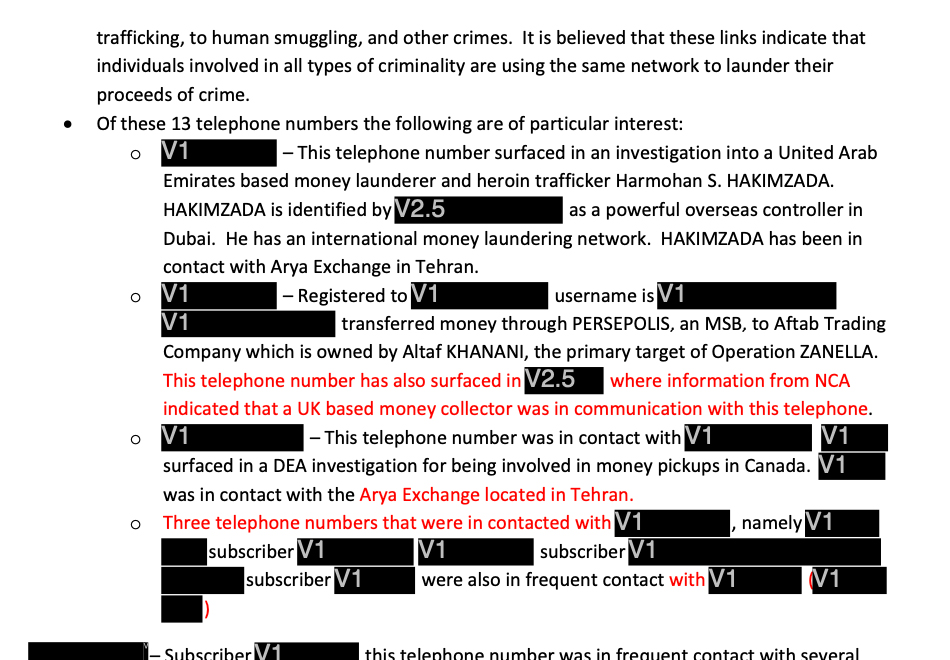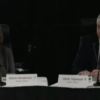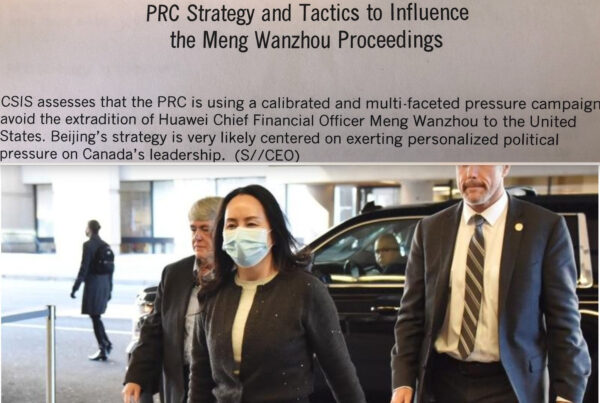“It was very clear from what I was seeing, that Mr. Ortis wanted to get in touch with Altaf Khanani” Ottawa trial hears

(Written by Sam Cooper. Originally published here on The Bureau. Reprinted with permission.)
Cameron Ortis, the former RCMP intelligence director, leaked classified information in 2015 that would have assisted Altaf Khanani, a major figure in Hezbollah’s global money laundering and terror financing operations, according to court testimony in Ottawa and related U.S. government allegations.
On Wednesday, RCMP Sgt. Peter Neily explained his part of Project Ace, an internal RCMP leak-hunt that focused on Ortis and his suspected corrupt contacts to Khanani’s network, in testimony that has ramifications beyond Canada, a former U.S. official involved in the Khanani probe told The Bureau.
The information coming to light in Ortis’ long-awaited trial also has resonance with underlying factors in the evolving war between Israel and Hamas, which is a terrorist group supported by Hezbollah, the Iranian-sponsored military power based in Lebanon that has also launched rockets into Israel this week.
Neily said he learned about Khanani’s organization and its power from reviewing the classified files, emails and plans discovered on an encrypted USB stick that Project Ace investigators seized from Ortis’ downtown Ottawa apartment in September 2019.
These documents and plans also named associates of Khanani’s network, including a powerful Dubai-based heroin trafficker and money launderer named Harmohan Singh Hakimzada, whose family is reportedly accused by Indian officials of funding Khalistan-separatist terror groups.
Another name tied by RCMP to Khanani’s money laundering network in Toronto, the documents filed in court show, included Mexican national Raul Bulhosen, a Sinaloa Cartel trafficker convicted in the largest ever cocaine-dealing bust in Ontario.
In testimony, Neily said he suspected Ortis tried to reach Hakimzada and Khanani and other global money launderers directly, but he could only prove that Ortis provided information on the Five Eyes probe targeting Khanani, to Khanani’s alleged Toronto-area agents, Salim Henareh and Muhammad Ashraf, who were RCMP investigation targets.
Neily said another top target in the Five Eyes Khanani probe, Toronto-area currency trader Farzam Mehdizadeh, escaped to Iran only days before RCMP planned to arrest him in 2017.
Ortis was trying to reach Mehdizadeh with Five Eyes leaks in 2015, Neily told the jury, but it was only proven that he successfully emailed to the man’s son at the University of Toronto.
“[Khanani’s network] was supporting known terrorist entities, cartels, and the drug trade — it was very significant,” Neily told the jury Wednesday. “It was very clear from what I was seeing, that Mr. Ortis wanted to get in touch with Altaf Khanani himself, who was the head of Khanani Organization, the multi-billion-dollar criminal organization.”
The worldwide investigation of Khanani and his agents in Canada was driven by the U.S. Drug Enforcement Administration, which recognized that Hezbollah — a political, military and criminal organization funded by Iran and opposed to Israel — was also funding terror and military operations in the Middle East by selling drugs and laundering drug money for other criminal organizations.
U.S. officials have told The Bureau they were surprised to learn Hezbollah had a major presence and key figures in Canadian cities.
They have also said they suspected a leak from Canada compromising worldwide Hezbollah investigations going back to about 2012, long before Ortis was arrested in 2019.
Also on Wednesday, outside of the Ottawa court proceedings, David Asher —formerly of US Special Operations Command for counter threat finance and a leader of the Khanani investigation — spoke to The Bureau on the significance of Khanani’s network, and ramifications of Canada’s case against Ortis.
“Khanani was one of the top-ten money launderers in the world,” Asher said. “He moved money across Sunni and Shia terrorist organizations. Very few people could launder money for al-Qaeda and also for Hassan Nasrallah [Hezbollah’s leader] and also pick up cartel drug money in Canada and Australia.”
Ortis has pleaded not guilty to six charges in the case, one of the most sensitive court hearings in Canadian history.
The charges include four under the Security of Information Act. He is accused of leaking Five Eyes intelligence and operational plans that assisted Khanani and other global money launderers and drug traffickers, Sgt. Neily said.
This is information that came into Ortis’ possession as an RCMP leader, but originated with the United States government and its primary partner in the Khanani probe, Australian Federal Police.
“The Five Eyes leads are extremely important for conducting international cases with complex money laundering schemes,” Asher said. “I don’t know we have ever had a leak at this level, involving personnel that are directly privy to this type of signals intelligence.”
“The aspects that were allegedly compromised in this case remain important,” Asher added. “I’m not blaming Canada, but I’m saying this guy was in the position to cause damages that well transcended Canada. He is not just law enforcement. His knowledge is a danger.”
Life threatening situation
Neily said when he first joined the Project Ace team, a covert unit of about ten people known to very few within the RCMP for operational security reasons, his first concern was that Ortis could have endangered lives of officers or agents involved in the Khanani probe.
That is what happened, Neily said, when Ortis revealed to Vincent Ramos, CEO of Vancouver encrypted texting company Phantom Secure, that an undercover RCMP officer would be approaching Ramos’ technical director during a controlled border search procedure at Vancouver airport in 2015.
“The identity of an undercover operator was burned, which I would classify as a life threatening situation,” Neily said Wednesday.
The trial has already heard that Ortis asked Ramos for $20,000 for leaked Five Eyes plans targeting Ramos’ company and its clients, including Khanani.
Evidence captured on Ortis’ USB stick shows that one of the emails that Ortis sent to Ramos in early 2015 said: “Keep in mind that this [law] enforcement and intelligence agency, they’re cooperating with each other on this, is designed to get to your users and clients (individuals like Polani, Khanani, some cartel members, and so on) by dismantling Phantom Secure.”
Around the same time in 2015, Ortis was sending classified packages and business proposals to Khanani’s agent in Mississauga, court heard, a man named Muhammad Ashraf.
Sgt. Neily told the jury he used production orders to obtain emails from Ortis to Ashraf that included attachments with Five Eyes intelligence on Khanani, Farzam Mehdizadeh, Harmohan Singh Hakimzada, and others.
The attachments also showed four suspects in Mississauga were targeted by the RCMP — including one arrested by U.S. Homeland Security for laundering money in Chicago — along with Khanani, and that Khanani shared an address with one of the Mississauga currency traders.
Information on Hakimzada and Khanani in these leaks included “top secret signals intelligence,” Neily said, as well as operational plans that would alert the Toronto targets of the Five Eyes probe — Farzam Mehdizadeh and Salim Henareh — and the bigger global targets, what police planned to do next.
“Top secret signals intelligence is highly confidential, secure information, that is only meant to be shared with people that have clearance,” Neily told the jury, “in some cases military or government. It is very, very protected information.”
No strings attached
Neily said he also confirmed in a phone interview with Salim Henareh, who was in Dubai at the time, that Henareh received a substantial package of leaks containing documents and letters found on Ortis’ USB stick.
Read the rest of the article here.








